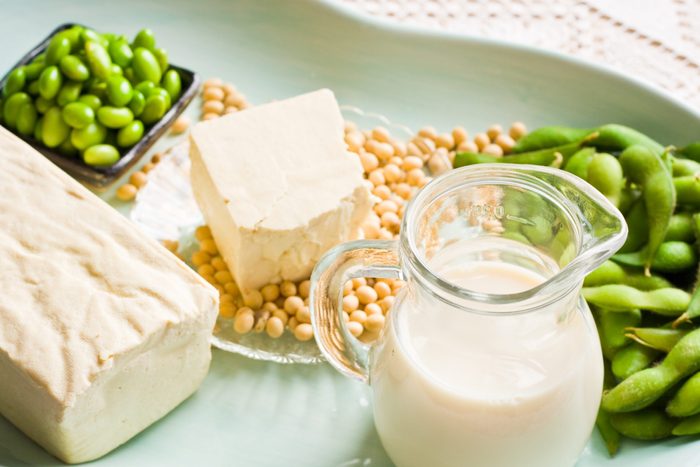
Calcium is the most abundant mineral found in the human body—but our bodies don’t actually produce this vital nutrient. Calcium is essential for bone health, and it also plays an important role in heart health, muscles and nerves. All this is why it’s imperative to include calcium-rich foods into our diet.
The combination of vitamin D and calcium have long been known for their bone health benefits, says Yasi Ansari, MS, RDN, CSSD and National Media Spokesperson for the Academy of Nutrition and Dietetics. “They’re a power duo—calcium and vitamin D work together for bone production. Vitamin D helps increase the absorption of calcium within the body. Other nutrients that can help support the bone include magnesium and getting enough carbs, protein and fats.”
Ansari shared that there are age-specific calcium recommendations:
- 9 to 18 years old: 1300 milligrams (mg)/day
- 18 to 50 years old: 1000 mg/day
- 51 years old and older: 1200 mg/day for females, and 1000 mg/day for males
Calcium may need to be individualized based on one’s health and medical history, Ansari adds, so adjust accordingly.
She suggests reading food labels as a way to start ensuring you are getting enough calcium. “When looking at the food label, I encourage consumers to choose foods with at least 20% or more of the Daily Value (DV). This indicates that a food is high in this particular nutrient.”
If you’re looking to include more calcium-rich foods in your diet to help with bone health, here are some of Ansari’s favorites.
Does Yoga Strengthen Your Bones? An Orthopedic Surgeon’s Answer Might Surprise You
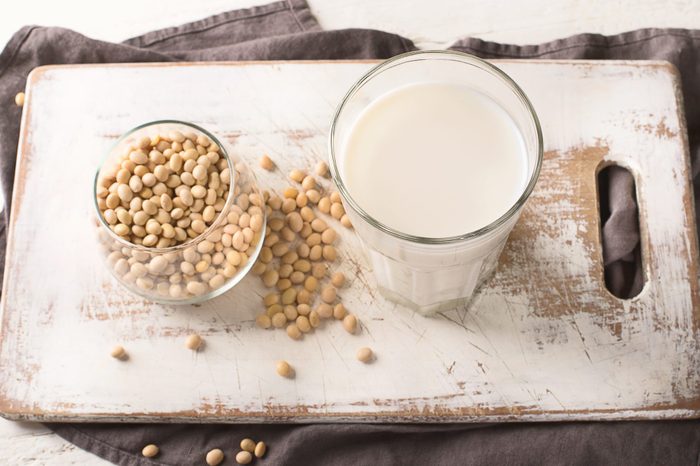
Calcium-rich foods for bone health
Soy Milk
It can vary by brand, but generally soy milk offers up to 300 to 450 milligrams of calcium in one cup, which is at least 20% of the DV. Soy milk is also a great dairy alternative, and offers seven grams of protein, similar to cow’s milk. Ansari likes adding her soy milk to cereal or a smoothie.
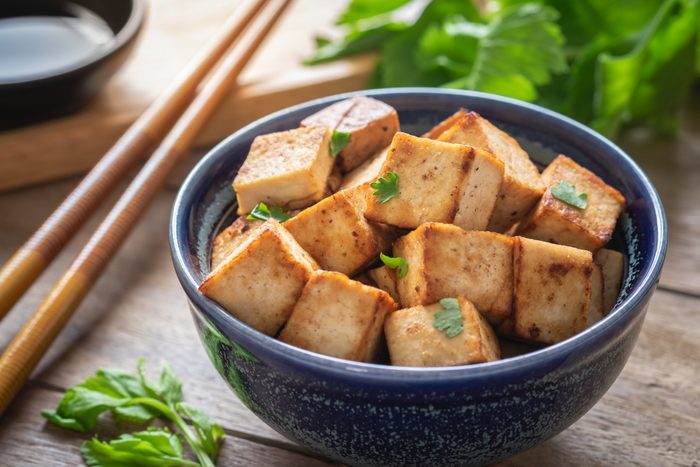
Tofu
A great plant-based protein option, tofu also numbers among Ansari’s favorite calcium rich foods for bone health. “Tofu can be added to stir-fry and tacos” Ansari says. She adds that according to the USDA, a half a cup of tofu offers about 434 mg of calcium which offers about 30% of the DV. An added benefit is that it has about ten grams of protein.

Calcium-fortified orange juice
Calcium and vitamin D work together to support bone health, Ansari shares. Research also supports vitamin D and its role in protecting health. A cup of orange juice offers 350 mg calcium, or 25% of DV, as well as 2.5 micrograms (mcg) of vitamin D, or 10% of the DV.
Dietitians Just Shared 6 Tips to Help Your Gut Absorb Vitamin D
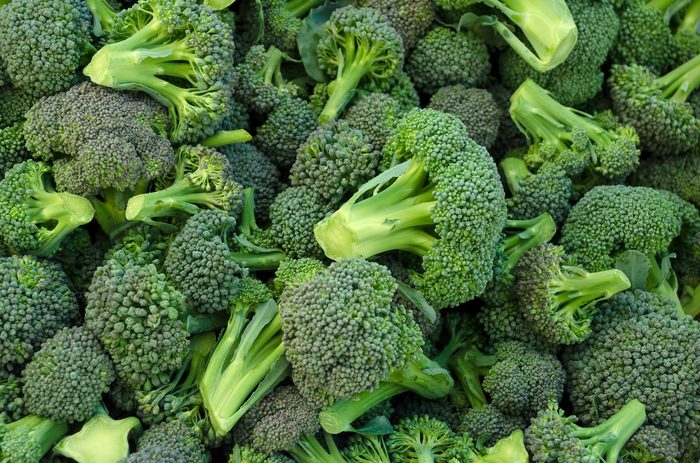
Broccoli
“While this is a food source that is lower in calcium than other foods, adding broccoli to one’s daily intake in addition to other calcium-rich foods can support bone health,” Ansari says. A half-cup of chopped broccoli offers 20.7 mg of calcium.
While this is a food source that is relatively lower in calcium, adding broccoli to one’s daily intake in addition to other calcium-rich foods can support bone health.
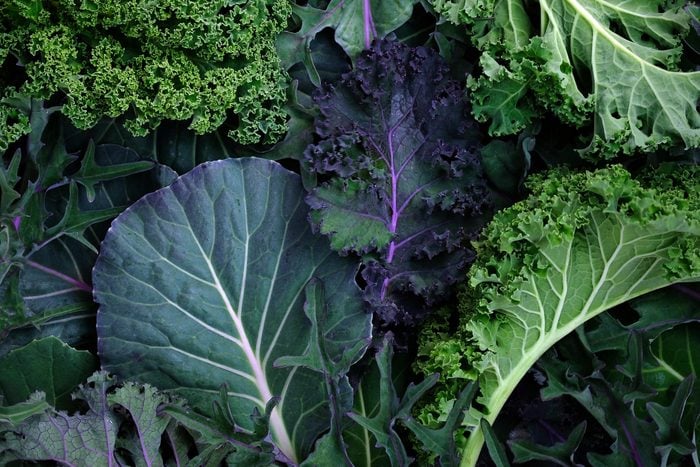
Kale
Consuming kale with other calcium-rich foods can help meet daily needs to support health and bone. Fun ideas include kale salad with broccoli, garbanzo beans and your choice of protein. One cup of chopped kale provides 101 mg of calcium.
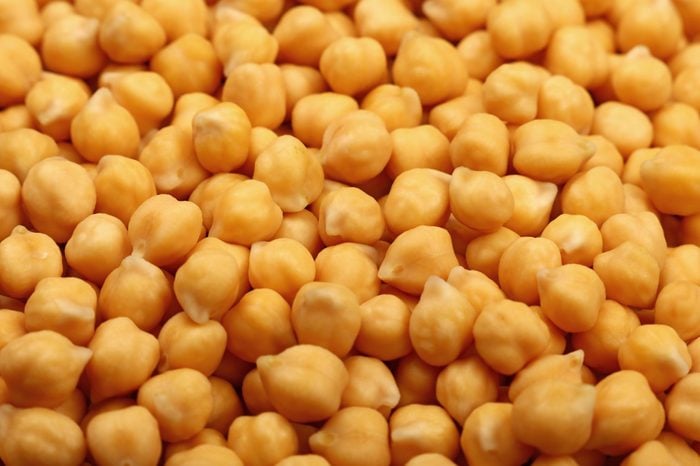
Beans
Beans offer protein, fiber and micronutrients like calcium, potassium, vitamin C and magnesium. A half-cup of soybeans offers 100 mg of calcium, while one cup of garbanzo beans offers 80 mg of calcium. You can add beans to a salad, soup or make a chili.

Cow’s milk
Most cow’s milk sold in the United States is vitamin D fortified, Ansari says. One cup of 1% milk provides 305 mg of calcium (23% of DV) and 8 grams of protein. The Healthy @Reader’s Digest’s Medical Review Board co-chair Latoya Julce recommends opting for organic cow’s milk.

Yogurt
Yogurt is a great addition to any snack or as part of the main meal. “I love adding almond, granola and berries to Greek yogurt,” Ansari says.
You can also add yogurt to a fruit smoothie for added calcium and protein. Regular yogurt offers 30% of the daily value, while Greek yogurt offers 20% of the DV.
If You Don’t Eat Yogurt Every Day, This Might Convince You to Start
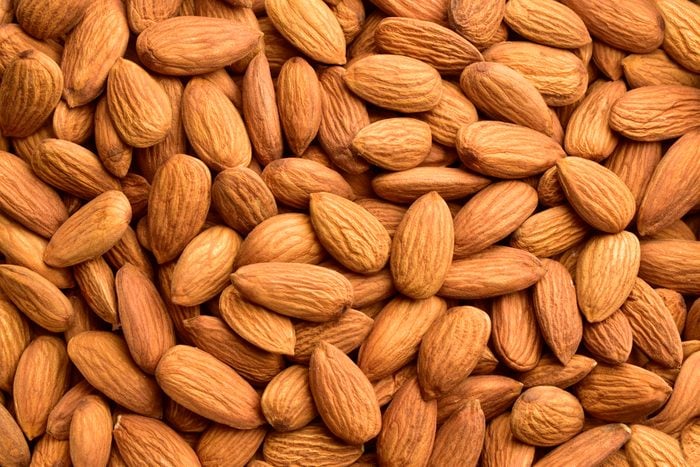
Almonds
Not only are almonds a delicious, protein-packed snack, they are also a great source of calcium. Ansari says that one cup of slivered almonds provides 28% of DV, which offers about 285 mg of calcium. One ounce, or 23 whole almonds, contains 7% of DV, or 75 mg of calcium and 3.5 gm of fiber.
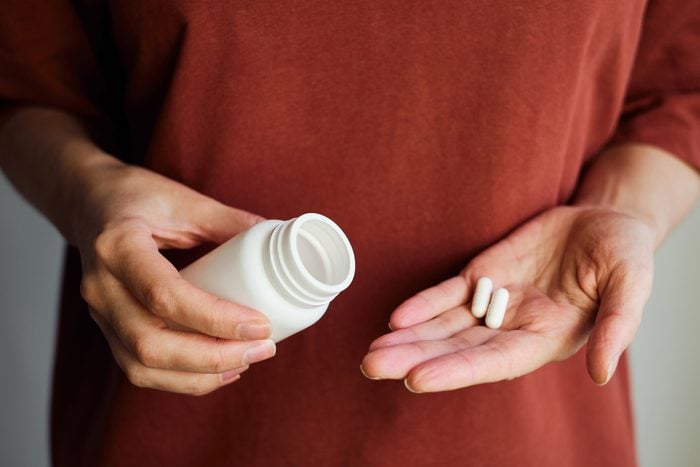
How to reach your daily calcium intake recommendations
When it comes to daily calcium intake and meeting needs, here are Ansari’s top five recommendations.
- Assess if you’re getting enough calcium from foods. Working with a registered dietitian nutritionist (RDN) can help with this. If you’re not meeting enough of your needs from foods, consider a calcium supplement.
- If you do need to supplement with calcium, try meeting half of your recommended calcium needs from foods and the other half from your supplement.
- When it comes to meeting your individual calcium needs through only your diet, spread out your calcium intake throughout the day to ensure optimal absorption. Aim for three to five sources of calcium-rich foods per day (depending on the source), three to four sources of higher-calcium foods, and four to five sources of a mix of foods that contain high and lower amounts of calcium.
- Caffeine intake can decrease calcium absorption. Consume caffeine at different times if you want to gain the benefits of calcium. Caffeine consumption in higher amounts can have more of an effect on calcium absorption.
- Aim for a variety of foods that contain calcium each day.

